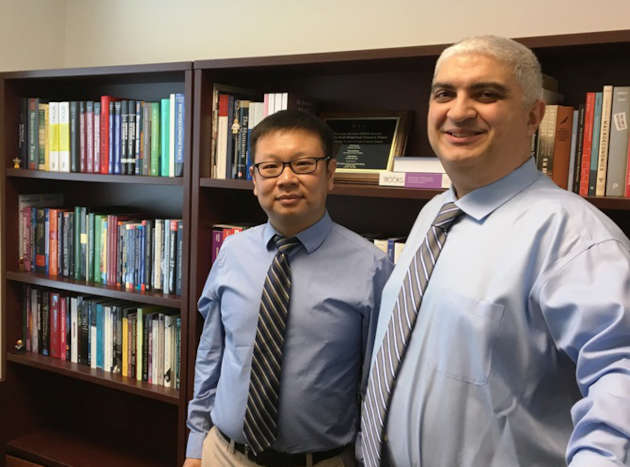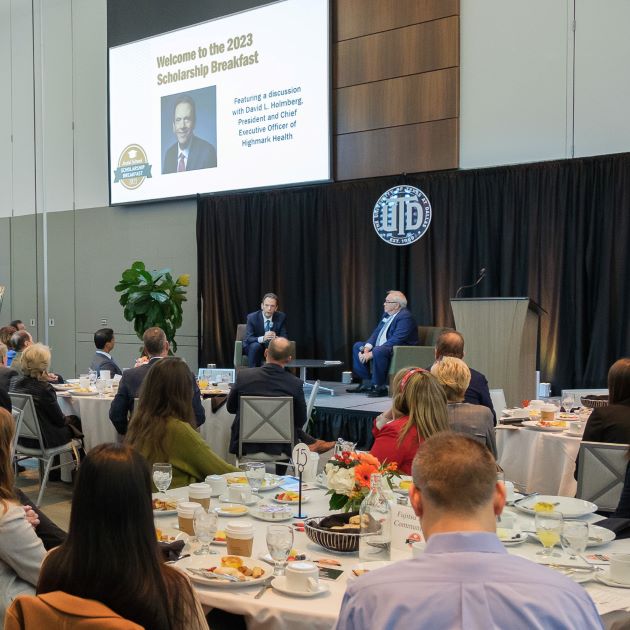
Two Naveen Jindal School of Management finance and managerial economics faculty members have earned recognition for their research as top finishers in the 2018 Crowell Prize competition. Sponsored by PanAgora Asset Management, the annual contest celebrates innovative research that connects theory with practice in the field of quantitative investment management.
Dr. Umit Gurun, also a professor in the accounting program, and his co-authors received first place for their paper, “IQ from IP: Simplifying Search in Portfolio Choice.” Dr. Jun Li, an associate professor, and his co-researcher earned the third-place prize for their paper, “The Expected Investment Growth Premium.”
The prize is named after PanAgora’s late founder, Dr. Richard A. Crowell, who was a pioneer in quantitative investing. In addition to a monetary prize, winners receive the opportunity to participate in co-publishing research throughout the year and attend a conference of their choice with PanAgora executives. The winning papers were chosen from approximately 140 submissions.
Gurun and his team studied the proliferation of investment signals and how mutual fund managers make decisions about what information to follow and, ultimately, act upon. They analyzed the tracking behavior of managers, following the Securities and Exchange Commission disclosures that the managers downloaded, how consistently they did so and how their information tracking impacted their portfolio decisions. The researchers specifically looked at insider-trading filings, finding the fund managers tend to track specific firms and top management of companies — CEOs, CFOS and board chairs — and that this behavior stayed constant over time.
“We were able to track people in a way that has never been done before,” Gurun said, referring to the novel IP address database the researchers developed. “Managers are more likely to track people they went to the same school with, and they’re more likely to track people that are geographically close to them,” Gurun said. “They’re also more likely to track senior officers and mimic those trades. Moreover, the persistence of managers’ behaviors in downloading company insiders’ trades improves performance.”
The research also has wider implications. “In the bigger picture of big data and information overload, this research is an example of what we can do to identify who is doing their job of creating risk-adjusted profits and how are they reducing the set of information overload into manageable chunks,” Gurun said.
Gurun’s co-authors are Huaizhi Chen of Harvard Business School, Lauren Cohen and Christopher Malloy of Harvard Business School and the National Bureau of Economic Research, and Dong Lou of the London School of Economics.
Jun Li, who earned a Crowell second-place prize in 2015 and third place in 2011 for previous research, focused on planned investments of firms and how they impact their risk premiums. Along with his co-author, Huijun Wang of the University of Delaware, Li developed a measure of investment plans called expected investment growth (EIG), and found that high EIG firms earned an annualized stock return that was 15 percent higher than low EIG firms among U.S. public firms from 1968 to 2016. Further, none of the leading asset-pricing factor models can capture this large EIG premium, Li said.
“Compared with firms with low EIG, firms with high EIG generate more cash flow several years into the future, indicating a strong incentive for these firms to expand their production capacity. Meanwhile, their cash flow moves more with business cycles because of their committed investment, so these firms are in fact riskier than firms with low EIG.” Li said.
Li believes his research is important for corporate managers as well as stock market investors. “Managers need to understand the risk associated with expansions of production capacity.” Li said. “Our findings also help to understand why past winning stocks on average outperform past losing stocks, a phenomenon in the stock market known as momentum.”
Li is currently in the journal submission process of his research, while Gurun and his team are looking at other business problems they can approach with their findings.
“Now that we know who demands what type of information there are a lot more interesting research questions to work on,” Gurun said.





